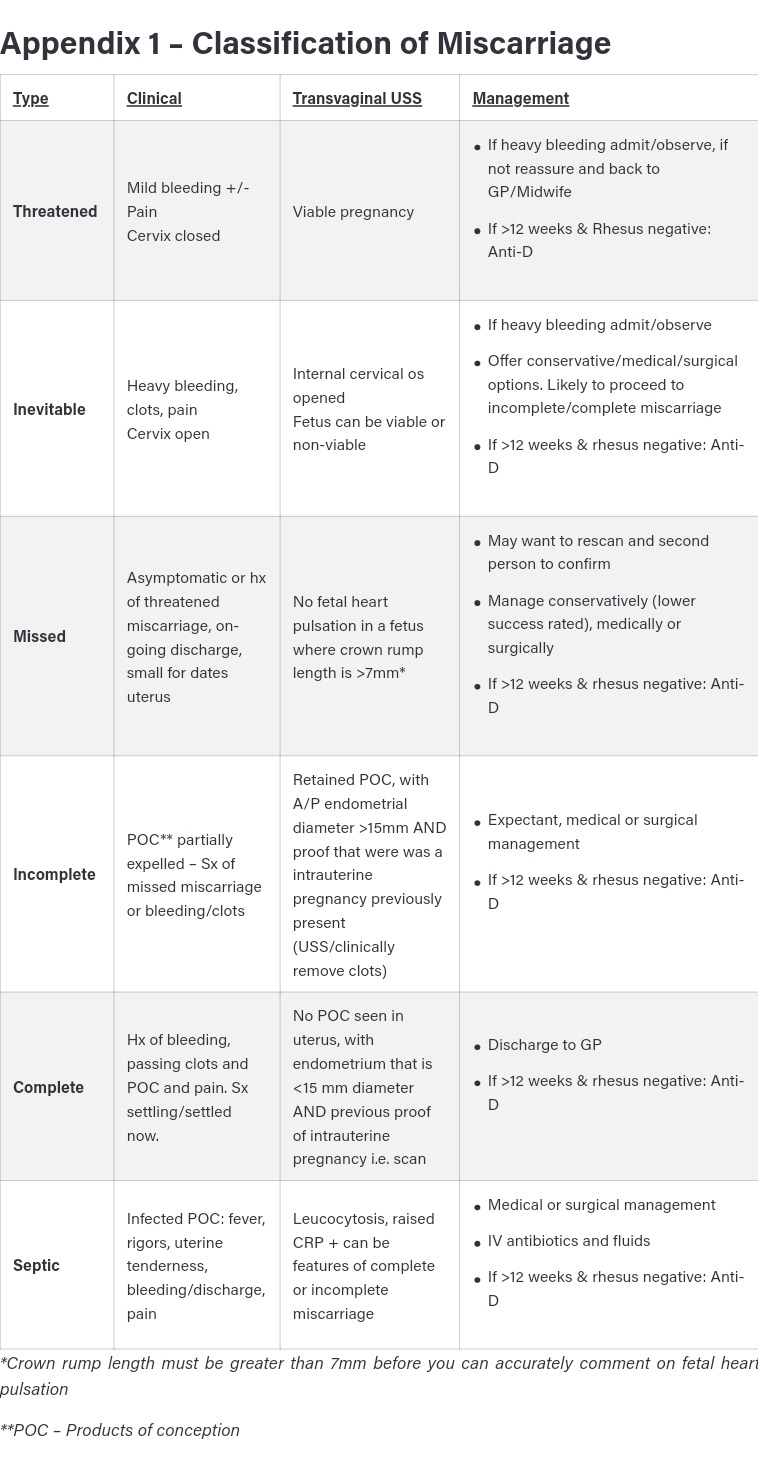Fact Check: "Every abortion ban allows treatment for miscarriage"
CLAIM: “Miscarriage treatment is legal in every state with an abortion ban”
Beginning in May 2022,1 following the leaking of a draft of the U.S. Supreme Court's Dobbs decision overturning Roe v. Wade, and continuing to the present, multiple anti-reproductive-rights groups have stated and continue to assert that every abortion ban in the U.S. permits the treatment of miscarriage (spontaneous abortion).2345678
VERDICT: FALSE❌️
A miscarriage (spontaneous abortion) is the ending of pregnancy “before the fetus has attained extrauterine viability.”9 There are different types of miscarriage and, contrary to common misconceptions, not all miscarriages involve an already deceased embryo/fetus, such as in cases of threatened miscarriage and inevitable miscarriage.10
The below graph, compiled by and published at TeachMe OBGYN, details the various types of miscarriage.
Multiple states’ abortion bans criminalize the medical (medication) and surgical (procedural) treatment of miscarriage when fetal heart tones can still be detected, such as in cases of inevitable miscarriage. This is because (1) the bans restrict the exemption for miscarriage management to cases in which no fetal heart tones are present; (2) the bans either have no health exemption or restrict the health exemption; and (3) 2013 guidelines issued by the Society of Radiologists in Ultrasound Multispecialty Panel on Early First Trimester Diagnosis of Miscarriage and Exclusion of a Viable Intrauterine Pregnancy, which have been criticized by the American College of Obstetricians and Gynecologists, are so conservative that doctors, post-Roe, are being extra cautious about diagnosing fetal/embryonic demise, delaying care while they gather enough evidence to defend themselves against possible criminal charges prior to terminating a pregnancy- even when it is firmly believed that the embryo/fetus has already expired (you can read more about this here).
As independent health policy organization KFF explains, “Some states’ abortion laws specify that care for ectopic pregnancies and pregnancy loss is not criminalized in its statutes. Most states with these provisions in their bans allow for the removal of a dead fetus or embryo, but not for miscarriage care, generally” (emphasis added).11 “This means that pregnant people who are actively miscarrying may be denied care if there is still detectable fetal cardiac activity. There have already been reports of such situations in Texas and Louisiana. In Louisiana, for example, a pregnant woman went to the hospital after experiencing sharp pain and bleeding. She was informed her fetus had likely stopped growing a few weeks prior, as its size did not correspond to the length of her pregnancy, and that it had very faint cardiac activity. Despite the pain and the blood loss she was experiencing, she could not receive the regimen of mifepristone and misoprostol commonly prescribed to pregnant patients who are miscarrying to ensure that the pregnancy is safely expelled from the body completely in a timely manner, thereby decreasing the risk of sepsis and infection. Instead, she had to wait for the miscarriage to progress without medical intervention, which would have expedited the process and reduced her medical risk. In states where the abortion bans do not clarify that miscarriage care is not criminalized – even when there is still detectable cardiac activity – pregnant people may not be able to receive care to manage their pregnancy loss unless and until it becomes a medical emergency.”12
Standard miscarriage care is further restricted by the narrowness of many state’s health exemptions. “Most states with bans that contain a health exception permit abortion care when there is a serious risk of substantial and irreversible impairment of a major bodily function. These exceptions are limited by the lack of specific clinical definitions of the conditions qualifying for the exception. Only the Arizona 15-week LMP (last menstrual period) limit explicitly defines the bodily functions that may be considered ‘major.’ The other states that use this language in their bans do not define what constitutes a “major bodily function,” nor what constitutes a “substantial impairment” to a major bodily function. This vague language puts physicians providing care to pregnant people in a difficult situation should their patients need an abortion to treat a condition jeopardizing their health and can leave the determination of whether an abortion can be legally provided to lawyers for the institution in which the clinician practices. For instance, in South Carolina where the 6-week LMP abortion limit has a health exception, the law lists a couple of conditions that may fall under this exception, such as severe pre-eclampsia and uterine rupture, but with no further detail. Using this language as guidance, it would be difficult for physicians to know if a significant health issue would fall under the exception. The difficulties presented by the simultaneous vagueness and narrowness of the exceptions are exacerbated by the lack of deference given to clinicians’ medical judgment under these bans.”13
“However, even if the terms in the exceptions were defined more clearly, they would still exclude many health conditions pregnant people face. In Georgia, for example, providers challenging the ban note that the exceptions do not permit abortion care when it is needed to prevent: “(1) substantial but reversible physical impairment of a major bodily function, (2) less than ‘substantial’ but irreversible physical impairment of a major bodily function, or (3) substantial and irreversible physical impairment of a bodily function that is not ‘major.’” A medical condition may still be a significant health event, yet not qualify under the exceptions, even if their limits were more clearly defined.”14
There are different types of miscarriage. Not every miscarriage involves an already deceased embryo/fetus. Multiple states criminalize medical or surgical miscarriage management if fetal heart tones can still be detected. The assertion by anti-reproductive-rights groups and activists that miscarriage treatment is legal in every state with an abortion ban is unequivocally FALSE❌️.
SBA Pro-Life America
https://x.com/sbaprolife/status/1528764985932922885?t=i4PZU1zF33RS-Oh8LsNVFg&s=19
SBA Pro-life America
https://x.com/sbaprolife/status/1818721057110474836?t=CrShW6UgO0Ca2agaQG0waQ&s=19
American Association of Pro-life Obstetricians and Gynecologists
https://x.com/aaplog/status/1623103193617137665?t=OWJm4-lYc5xmKeBcoXadaQ&s=19
American Association of Pro-life Obstetricians and Gynecologists
https://x.com/aaplog/status/1570477804713644032?t=dadCgUiSK2JTiJZTlz_VFw&s=19
Charlotte Lozier Institute
https://x.com/LozierInstitute/status/1769237226108657832?t=D0ESQDgZqa881huuOb9Sww&s=19
Live Action
https://x.com/LiveAction/status/1779899354867798170?t=ahTl3MveqMavxQxyL263aw&s=19
SBA Pro-life America
https://x.com/sbaprolife/status/1793783340622909460?t=Z6ZAOSTVVMhRZFLgQKcHYw&s=19
SBA Pro-life America
https://x.com/sbaprolife/status/1806412086894862538?t=4r4czCR1JAYU_dxeV5v7-w&s=19
Miscarriage: Taber’s Medical Dictionary. miscarriage | Taber’s Medical Dictionary. (n.d.). https://www.tabers.com/tabersonline/view/Tabers-Dictionary/750940/all/miscarriage
TeachMe OBGYN. (2022, July 11). Miscarriage - threatened - missed - complete - septic. TeachMeObGyn. https://teachmeobgyn.com/pregnancy/early/miscarriages/
Sobel, L., & Felix, M. (2024b, June 6). A review of exceptions in state abortion bans: Implications for the provision of abortion services. KFF. https://www.kff.org/womens-health-policy/issue-brief/a-review-of-exceptions-in-state-abortions-bans-implications-for-the-provision-of-abortion-services/
Sobel, L., & Felix, M. (2024b, June 6). A review of exceptions in state abortion bans: Implications for the provision of abortion services. KFF. https://www.kff.org/womens-health-policy/issue-brief/a-review-of-exceptions-in-state-abortions-bans-implications-for-the-provision-of-abortion-services/
Sobel, L., & Felix, M. (2024b, June 6). A review of exceptions in state abortion bans: Implications for the provision of abortion services. KFF. https://www.kff.org/womens-health-policy/issue-brief/a-review-of-exceptions-in-state-abortions-bans-implications-for-the-provision-of-abortion-services/
Sobel, L., & Felix, M. (2024b, June 6). A review of exceptions in state abortion bans: Implications for the provision of abortion services. KFF. https://www.kff.org/womens-health-policy/issue-brief/a-review-of-exceptions-in-state-abortions-bans-implications-for-the-provision-of-abortion-services/



